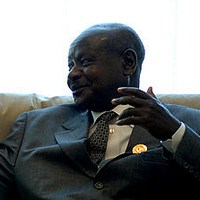A panel discussion on Thursday organized by the Center for Human Rights and Global Justice at the New York University School of Law discussed options for U.S. policy toward Uganda, after relations were ruffled by a new Ugandan law signed in February that imposes harsh legal penalties, including life sentences, for homosexual acts. As the U.S. moves forward with its promised review of its relationship with Uganda, the question is whether the Obama administration can produce an effective response to the new law or if the U.S. will be boxed into a narrow response that feeds perceptions of American imperialism.
Washington is caught between a canny political actor in Ugandan President Yoweri Museveni, on one hand, and a powerful outcry from domestic constituencies in the U.S., on the other, who want their government to push back hard to uphold universal rights. Determining just how to push back, however, is raising some tough questions about the nature—and uses—of aid.
“We don’t know whether aid is aid or whether it’s a weapon of foreign policy,” said Francis Ssekadi, a former judge at the High Court of Uganda, in remarks at the panel discussion. “The time when you could blackmail African leaders with a withdrawal of aid has passed,” he added.

